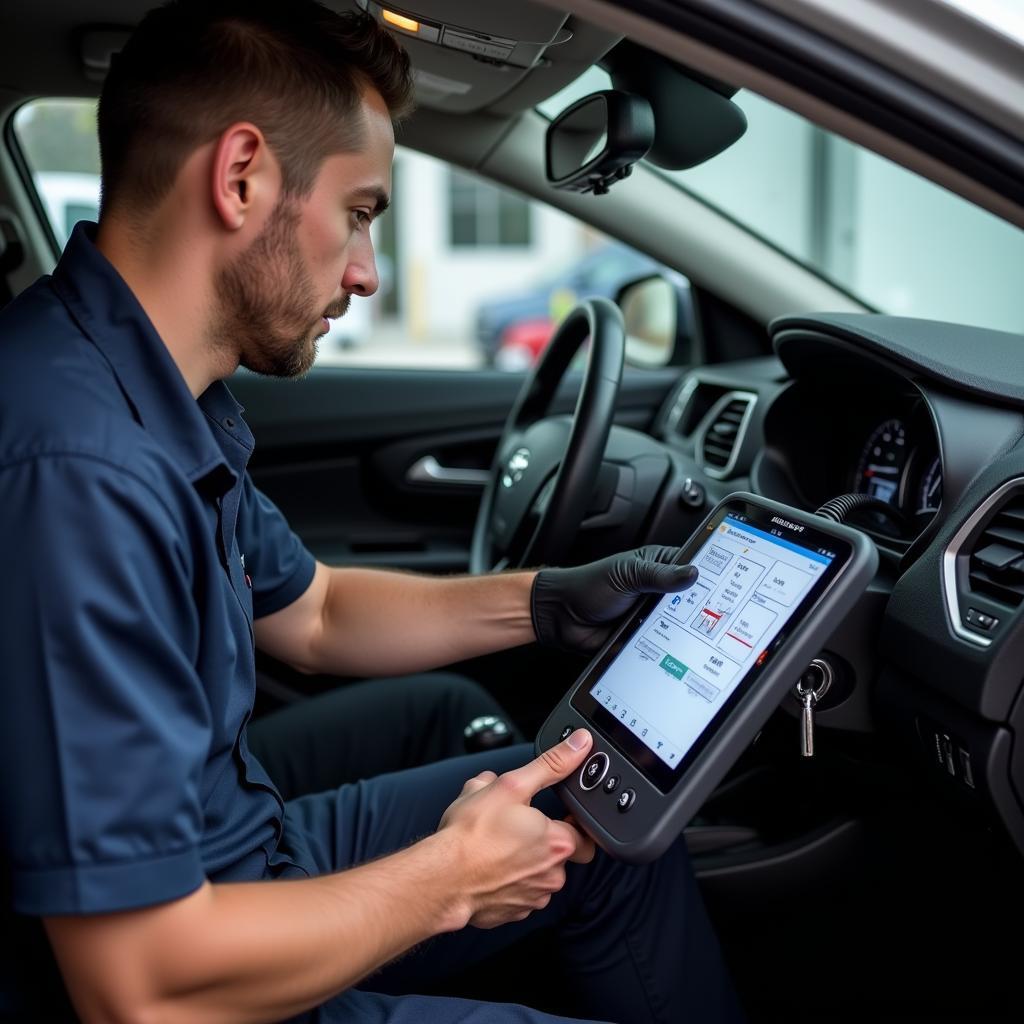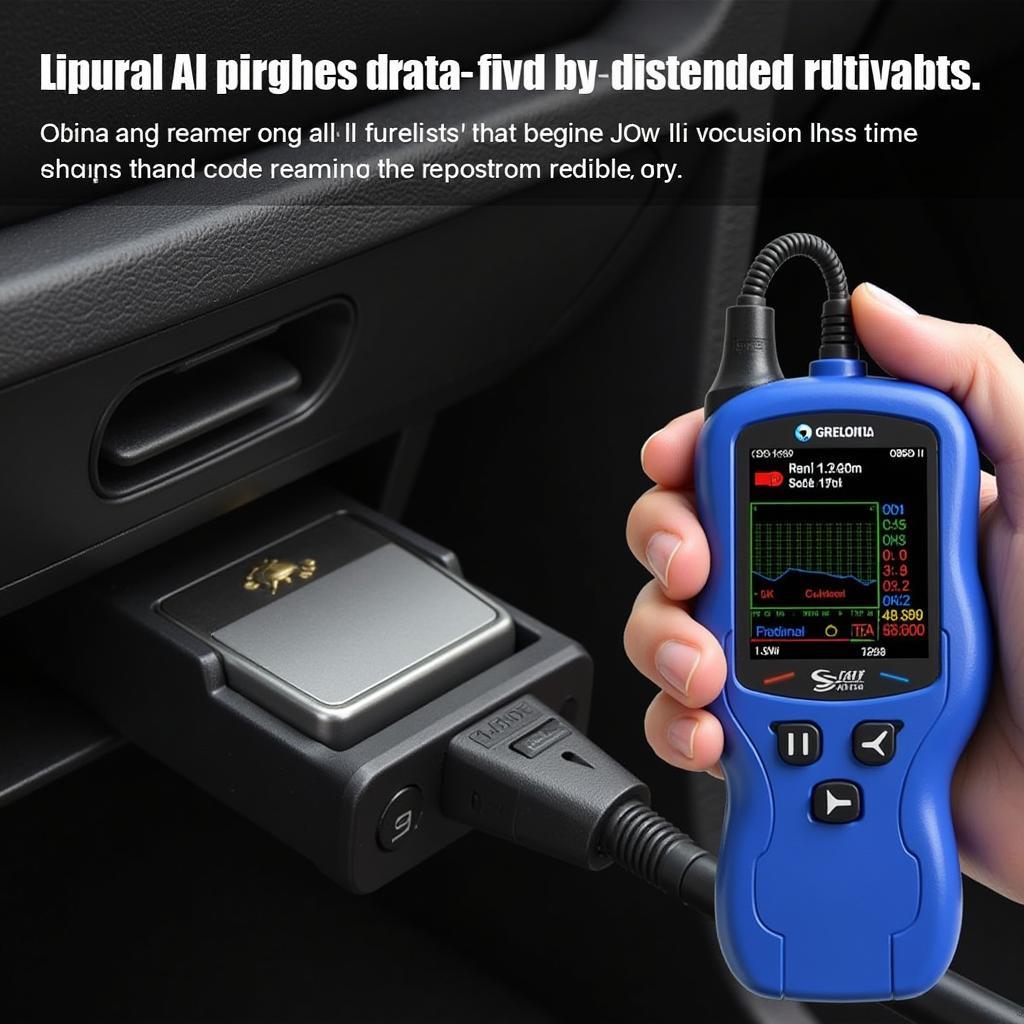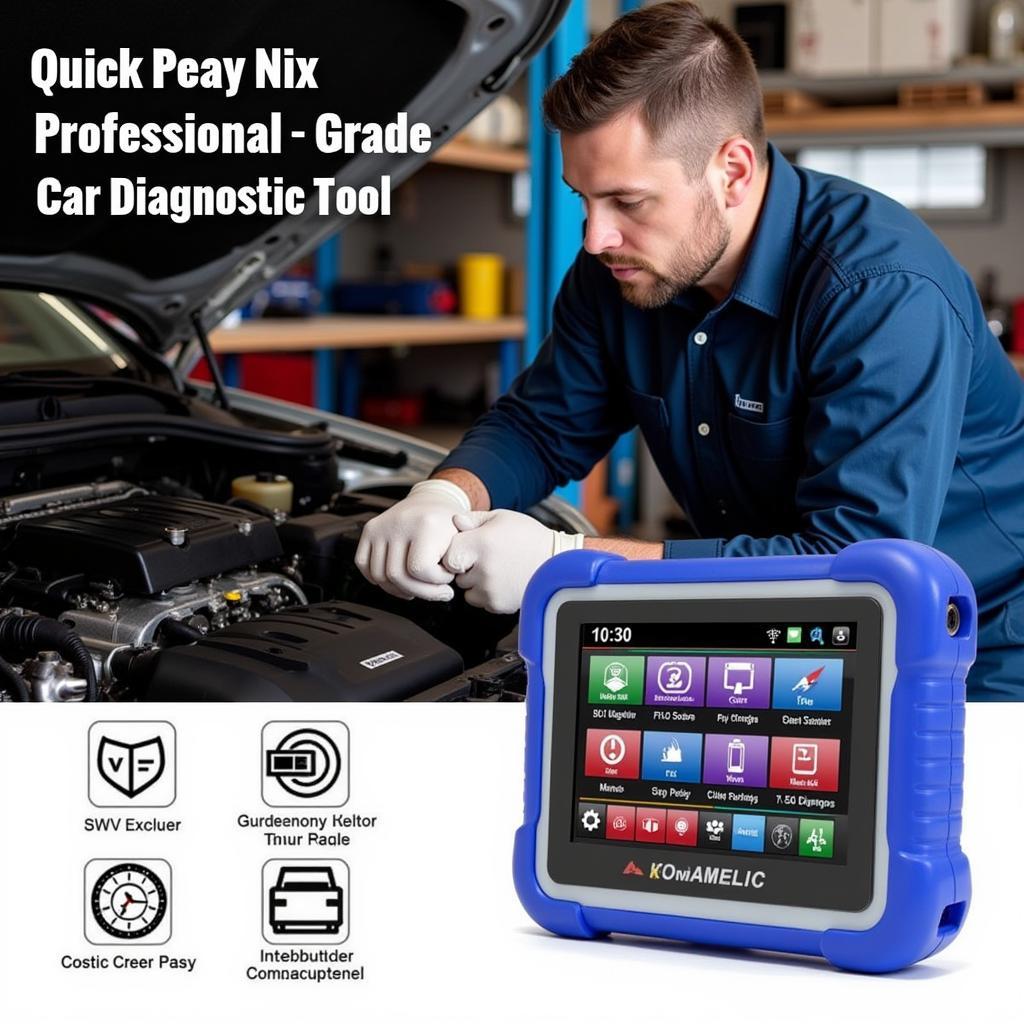When your car throws a tantrum, a reliable car diagnostic tool can be your best friend. From deciphering cryptic dashboard lights to pinpointing the source of that unsettling noise, these tools empower both DIY enthusiasts and seasoned mechanics to diagnose and potentially fix issues with greater accuracy. But with a dizzying array of options on the market, finding The Best Car Diagnostic Tool for your needs can feel like navigating a mechanic’s worst nightmare.
Unveiling the Importance of a Quality Car Diagnostic Tool
Gone are the days of relying solely on gut feeling and the shade of exhaust smoke to diagnose car problems. Today’s vehicles are rolling computers, packed with intricate systems and sensors that demand a sophisticated approach to troubleshooting. This is where a top-tier car diagnostic tool comes into play, providing a window into your vehicle’s inner workings and offering insights that can save you time, money, and unnecessary trips to the mechanic.
 Mechanic Using Best Car Diagnostic Tool
Mechanic Using Best Car Diagnostic Tool
Key Features to Consider When Choosing a Diagnostic Tool
Before diving into specific recommendations, let’s break down the key features that distinguish the best car diagnostic tools from the rest:
- Vehicle Compatibility: Ensure the tool supports your vehicle’s make, model, and year. Some tools specialize in specific brands, while others offer broader coverage.
- Functionality: Basic code readers offer a starting point, but for more advanced diagnostics, opt for tools that can read and clear trouble codes, display live data streams, perform active tests, and even program modules.
- User Interface: Look for an intuitive interface with clear menus, logical navigation, and easy-to-understand data presentation.
- Connectivity: Consider tools with Bluetooth or WiFi capabilities for seamless data transfer and software updates.
- Durability and Build Quality: Choose a tool that can withstand the rigors of a workshop environment, featuring robust construction and quality components.
Decoding the Different Types of Car Diagnostic Tools
The world of car diagnostic tools offers a diverse range of options, each tailored to specific skill levels and diagnostic needs. Here’s a breakdown of the most common types:
1. Code Readers: The Entry-Level Essentials
Code readers are the gateway drug to car diagnostics, offering a simple and affordable way to read and clear basic trouble codes. These pocket-friendly devices connect to your vehicle’s OBD-II port and display the error codes triggering those pesky dashboard lights. While code readers won’t provide in-depth analysis, they’re a valuable first step in identifying potential issues.
2. OBD-II Scanners: Taking Diagnostics a Step Further
OBD-II scanners offer a step up from basic code readers, providing a wider range of diagnostic capabilities. In addition to reading and clearing codes, these tools can display live data streams from various sensors, allowing you to monitor engine performance, emissions, and other vital parameters in real time. Many OBD-II scanners also offer additional features like freeze frame data, VIN retrieval, and readiness monitors.
 Car Diagnostic with OBD-II Scanner
Car Diagnostic with OBD-II Scanner
3. Professional-Grade Scan Tools: The Mechanic’s Arsenal
For serious automotive enthusiasts and professional mechanics, professional-grade scan tools are the gold standard. These comprehensive diagnostic powerhouses offer an unmatched level of functionality, allowing you to perform advanced tasks such as:
- Bi-Directional Control (Active Tests): Send commands to various vehicle components to test their functionality.
- Module Programming: Flash new software updates to various modules, including engine control units (ECUs) and transmission control modules (TCMs).
- Key Programming: Program new keys and remotes for your vehicle.
Top Considerations for Choosing the Best Tool for You
Selecting the best car diagnostic tool boils down to your specific needs, budget, and technical proficiency. Ask yourself these questions to narrow down your choices:
- What level of diagnostic depth do you require? Are you primarily interested in reading and clearing codes, or do you need more advanced capabilities like live data streaming and module programming?
- What is your budget? Prices for car diagnostic tools can range from affordable code readers to high-end professional-grade scanners.
- What is your comfort level with automotive technology? Some tools offer simpler interfaces geared towards DIYers, while others require a deeper understanding of automotive systems.
 Professional Mechanic Using Advanced Diagnostic Tool
Professional Mechanic Using Advanced Diagnostic Tool
Conclusion: Empowering Yourself with the Right Diagnostic Tool
Investing in the best car diagnostic tool is an investment in your vehicle’s well-being and your own peace of mind. Whether you’re a DIY enthusiast tackling basic repairs or a seasoned mechanic seeking cutting-edge diagnostic capabilities, the right tool can save you time, money, and frustration. By carefully considering your needs, budget, and technical expertise, you can confidently choose a tool that will empower you to diagnose and address car problems with greater efficiency and accuracy.
FAQs
Q: Do I need a car diagnostic tool if my car is still under warranty?
A: While it’s not mandatory, having a diagnostic tool can be beneficial even if your car is under warranty. It can help you identify potential issues early on and provide you with information to discuss with your dealer, potentially saving you time and unnecessary trips.
Q: Can I use a car diagnostic tool on any vehicle?
A: Not all diagnostic tools are universally compatible. It’s crucial to ensure the tool you choose supports your vehicle’s make, model, and year.
Q: Are expensive diagnostic tools always better?
A: Not necessarily. The best tool for you depends on your individual needs and skill level. A basic code reader might suffice for simple diagnostics, while professional-grade tools are more appropriate for advanced users.
Q: Can a car diagnostic tool fix my car problems?
A: While diagnostic tools can identify problems, they don’t inherently fix them. They provide valuable information to help you understand the issue and determine the appropriate course of action, whether it’s a simple DIY fix or a visit to a mechanic.
Q: What’s the difference between OBD-I and OBD-II?
A: OBD-I (On-Board Diagnostics-I) was an earlier standard for vehicle diagnostics, while OBD-II is the current standardized system used in most vehicles manufactured after 1996.
For further assistance and expert advice, don’t hesitate to contact our dedicated support team via WhatsApp at +1(641)206-8880 or email us at [email protected]. Our 24/7 customer service representatives are here to guide you every step of the way. Explore our website for a comprehensive selection of the best car diagnostic tools to meet your specific needs. You can also find more detailed information about the best car diagnostic tool australia or explore options for the best car diagnostic tool uk 2019. For those interested in advanced functionalities, we have a dedicated section on the best car diagnostic programing tool. Don’t forget to check out our reviews on the best car diagnostic tool 2015 uk to see how older models compare.

Leave a Reply